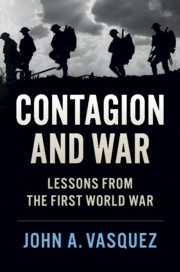138 results
478 Magnetic Resonance Biomarkers of Metabolic Dysfunction-Associated Steatotic Liver Disease
- Part of
-
- Journal:
- Journal of Clinical and Translational Science / Volume 8 / Issue s1 / April 2024
- Published online by Cambridge University Press:
- 03 April 2024, p. 141
-
- Article
-
- You have access
- Open access
- Export citation
Delirium in oncological palliative care and clinical cardiology units: A comparative analysis
-
- Journal:
- Palliative & Supportive Care / Volume 21 / Issue 5 / October 2023
- Published online by Cambridge University Press:
- 27 July 2022, pp. 805-811
-
- Article
- Export citation
Neurocognitive Outcome Following Recovery from Severe Acute Respiratory Syndrome – Coronavirus-1 (SARS-CoV-1)
-
- Journal:
- Journal of the International Neuropsychological Society / Volume 28 / Issue 9 / October 2022
- Published online by Cambridge University Press:
- 07 September 2021, pp. 891-901
-
- Article
- Export citation
Introduction
-
- Book:
- Contagion and War
- Published online:
- 13 December 2018
- Print publication:
- 22 November 2018, pp 1-6
-
- Chapter
- Export citation
Preface
-
- Book:
- Contagion and War
- Published online:
- 13 December 2018
- Print publication:
- 22 November 2018, pp xi-xiv
-
- Chapter
- Export citation
Subject Index
-
- Book:
- Contagion and War
- Published online:
- 13 December 2018
- Print publication:
- 22 November 2018, pp 389-401
-
- Chapter
- Export citation
7 - How Contagion Actually Worked
- from Part III - Conclusions: Lessons from the First World War
-
- Book:
- Contagion and War
- Published online:
- 13 December 2018
- Print publication:
- 22 November 2018, pp 310-371
-
- Chapter
- Export citation
Name Index
-
- Book:
- Contagion and War
- Published online:
- 13 December 2018
- Print publication:
- 22 November 2018, pp 387-388
-
- Chapter
- Export citation
References
-
- Book:
- Contagion and War
- Published online:
- 13 December 2018
- Print publication:
- 22 November 2018, pp 372-386
-
- Chapter
- Export citation

Contagion and War
- Lessons from the First World War
-
- Published online:
- 13 December 2018
- Print publication:
- 22 November 2018
Contents
-
- Book:
- Contagion and War
- Published online:
- 13 December 2018
- Print publication:
- 22 November 2018, pp vii-viii
-
- Chapter
- Export citation
2 - Research Design
- from Part I - Theoretical Expectations
-
- Book:
- Contagion and War
- Published online:
- 13 December 2018
- Print publication:
- 22 November 2018, pp 45-68
-
- Chapter
- Export citation
3 - 1914: The Local War and the First Wave
- from Part II - Dyadic Case Analyses: History and Data
-
- Book:
- Contagion and War
- Published online:
- 13 December 2018
- Print publication:
- 22 November 2018, pp 71-182
-
- Chapter
- Export citation
Copyright page
-
- Book:
- Contagion and War
- Published online:
- 13 December 2018
- Print publication:
- 22 November 2018, pp iv-iv
-
- Chapter
- Export citation
Dedication
-
- Book:
- Contagion and War
- Published online:
- 13 December 2018
- Print publication:
- 22 November 2018, pp v-vi
-
- Chapter
- Export citation
5 - 1917: The Third Wave
- from Part II - Dyadic Case Analyses: History and Data
-
- Book:
- Contagion and War
- Published online:
- 13 December 2018
- Print publication:
- 22 November 2018, pp 222-268
-
- Chapter
- Export citation
Part I - Theoretical Expectations
-
- Book:
- Contagion and War
- Published online:
- 13 December 2018
- Print publication:
- 22 November 2018, pp 7-68
-
- Chapter
- Export citation
4 - 1915–1916: The Second Wave
- from Part II - Dyadic Case Analyses: History and Data
-
- Book:
- Contagion and War
- Published online:
- 13 December 2018
- Print publication:
- 22 November 2018, pp 183-221
-
- Chapter
- Export citation
Part II - Dyadic Case Analyses: History and Data
-
- Book:
- Contagion and War
- Published online:
- 13 December 2018
- Print publication:
- 22 November 2018, pp 69-268
-
- Chapter
- Export citation
Plate Section (PDF Only)
-
- Book:
- Contagion and War
- Published online:
- 13 December 2018
- Print publication:
- 22 November 2018, pp 389-402
-
- Chapter
- Export citation



